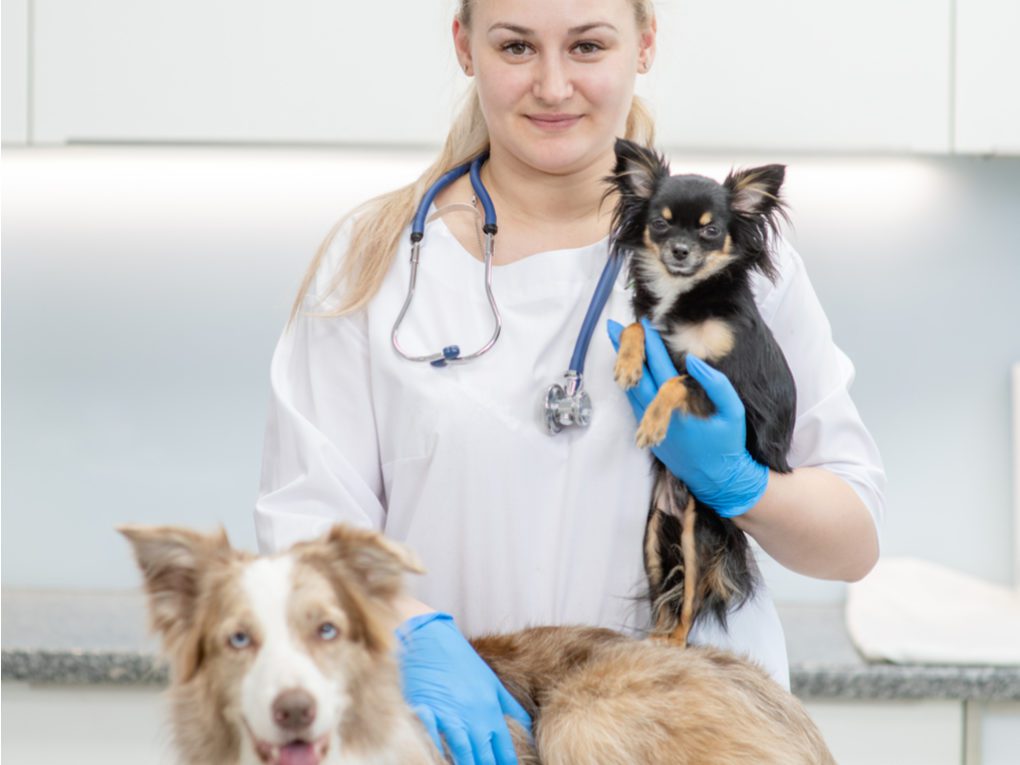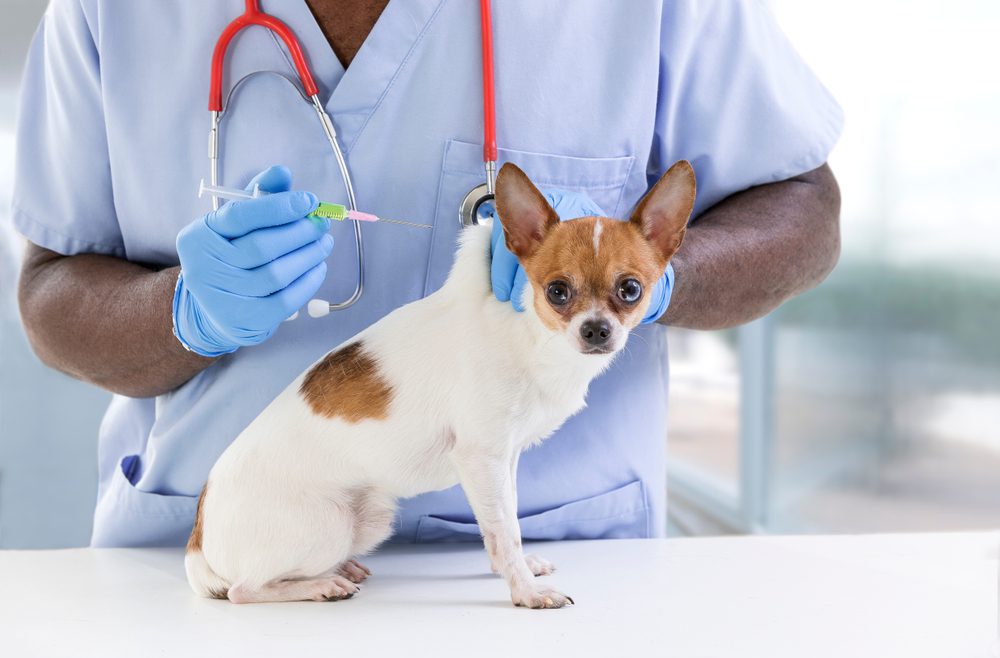This is part 6 of our series of posts about Everything You Need To Know About Your Chihuahua’s Vaccines. We have already discussed core and non-core vaccines, and we talked about what disease or virus each vaccine is supposed to protect your Chihuahua from. In this part 6 of our series, we will learn what the new protocol is regarding your Chihuahua’s vaccines and how often do you actually need a booster First, let’s talk about the potential risks of these vaccines.
Are We Over Vaccinating Our Chihuahuas?
Most say that the benefits far outweigh the risks, but I disagree with that blanket statement. Yes, I agree that the benefits far outweigh the risks of some vaccines. However, I also believe after much research on the latest information and what canine immunologist are saying, that we are over-vaccinating our pets. Chihuahua’s are especially vulnerable because they are the smallest dog breed. Do you really want to continually put all those chemicals into his or her body over a lifetime?

I think that all the veterinary clinics, hospitals, and other “official” sites make this blanket statement because most people don’t know much — if anything about vaccines. I know I didn’t until I started working at a veterinary hospital and began to do some serious research on the subject. So they make that statement and encourage everyone to get all the vaccines for their dogs in order to keep the pet population and the human population as a whole safe from some pretty nasty, even deadly diseases.
What’s In A Vaccine?
Of course, there are antigens, but also added are adjuvants to enhance the immune system response. There are antibiotics, to prevent contamination during the manufacturing process and preservatives as well as stabilizers. These include:
- Thimerosal
- Formaldehyde
- Aluminum
- Antibiotics
- Gelatin
- Monosodium Glutamate (MSG)
What Are The Risks of Vaccines?
I no longer work at a veterinary hospital, but while I was there I saw not a few, but many come in every day with some side effects from the vaccine that was recently given to their dog. Some minor and some very serious. I recommend that when you get your puppy or adult vaccinated that you do it at a time when you can be with them to monitor them afterward.
Don’t get your Chihuahua vaccinated and then go to work leaving him home alone. Even if they have had that vaccine all their life, they can still have an adverse reaction to it the next time. The following are the symptoms that you should watch for:
- Fever
- Lethargy
- Loss of appetite
- Facial or paw swelling and/or hives
- Vomiting
- Diarrhea
- Pain or swelling around the injection site
These are some of the common and moderate risks to vaccines. However, there are some less common life-threatening risks also. Just a few of these include:
- Vaccine injection site sarcomas
- Autoimmune hemolytic anemia
- Disease or enhanced disease that the vaccine was designed to prevent
- Abortion, congenital anomalies
- Collapse, difficulty breathing, and seizures )anaphylactic shock)
These reactions or adverse side effects are rare, or so they say, however, I now know that they are not as rare as we have come to believe. While working at the veterinary hospital dogs came in every single day with some type of adverse reaction to a vaccine.
Vaccine Research
Dr. Ronald Schultz Ph.D., a veterinary immunologist, chaired the University of Wisconsin’s Department of Pathobiological Sciences. He spent his career as a veterinary immunologist at the forefront of vaccine research.
The vaccines that Dr. Schultz included in his studies included:
- Canine distemper vaccine (core)
- Canine parvovirus vaccine (core)
- Rabies vaccine (core)

He also studied some feline vaccines, however, since we are Chihuahua owners, we will stick with the canine vaccine research. If you also are a mom to a cat as I am, you can find some of his studies in this article at; University of Wisconsin School of Veterinary medicine.
The Results
The findings from Dr. Schultz’s research is that vaccines minimum duration of immunity of the disease is as follows:
- Distemper – 7 years by challenge/15 years by serology
- Parvovirus – 7 years by challenge/7 years by serology
- Andenovirus – 7 years by challenge/9 years by serology
- Canine rabies – 3 years by challenge/7 years by serology
So, what do “by challenge” and “by serology” mean? Challenge means that in the trial the dog was exposed to the disease and serology means they measured blood antibody levels. Thanks to Covid 19, I think we are all pretty much aware of what antibody levels mean. But, in case you don’t, it means how long the antibodies remained in the body that will still fight off the disease.
Dr. Schultz’s conclusion was:
“Vaccines for diseases like distemper and canine parvovirus once administered to adult animals provide lifetime immunity.”
Other immunologists agree with this conclusion. One of these is Dr. Ian R. Tizard who is University Distinguished Professor of Immunology Emeritus at Texas A&M University
Is Your Veterinarian Hiding The Truth?
In spite of the research most (not all), veterinarians continue to vaccinate pets annually. Some prefer to follow the every 3-year protocol. Since this information has been available for many years and has never been disproven, why do they still vaccinate annually or every 3 years?
Is it money? The American Animal Hospital Association (AAHA) reports that revenue from vaccines is about 15% of the average practice’s income. So some veterinarians stand to lose a lot of money every year should they adopt the new protocol.

Vaccinating pets as part of their annual checkups became prominent in the 1980s and became a way of practice adopted by all veterinarians in the 1990s. So, although money may be a factor, some just do it because they don’t want to or see a need to change.
While rabies vaccines are highly efficacious, they are also among the most reactogenic of vaccines. Redundant rabies vaccination exposes dogs to excipients and other compounds unrelated to the vaccine antigens while increasing the needless risk of adverse events. Despite the “gross under-reporting of vaccine-associated adverse events” cited in the 2007 World Small Animal Veterinary Association (WSAVA) Vaccine Guidelines research has shown that potent adjuvanted, killed rabies vaccines elicit the most frequent and severe adverse reactions in animals, which emphasizes the importance of vaccinating at intervals only as necessary to confer or maintain immunity to disease. ~ US National Library of Medicine
One immunologist. Dr. Richard Ford, Professor of Medicine, North Carolina State University was quoted as saying:
“Both the AAHA and the AVMA must do more to step up to the plate.”
Dr. Bob Rogers was quoted as saying:
“While attending conferences I have asked over 400 veterinarians from various parts of the country if they attended the seminars on the new vaccines protocols. He was told by all but one, “I don’t care what the data says, I am not changing.”
There are many other veterinarians who are questioning the over-use of vaccines for our dogs and cats. Dr. Karen Becker, DVM, and Dr. John Robb, DVM are just two of many.
What Can You Do?
This series is not to scare you, but to give you the knowledge to be your Chihuahua’s advocate. There are risks to be aware of regarding vaccines. To help you to protect him with knowledge.
Don’t miss our next post in this series. It will tell you exactly how you can be your Chihuahua’s advocate without insulting your hard-working veterinarian.
Don’t miss any of our informative articles and tips! Subscribe to our Weekly Tips (below) and to our Monthly Newsletter to get notified of new posts, Chihuahua information, and tips!
Did you miss the first of this series? To begin with the introduction CLICK HERE









